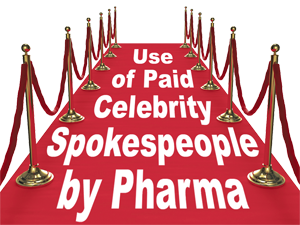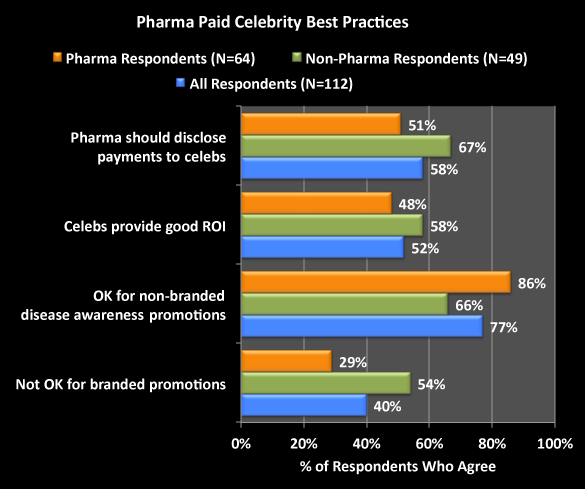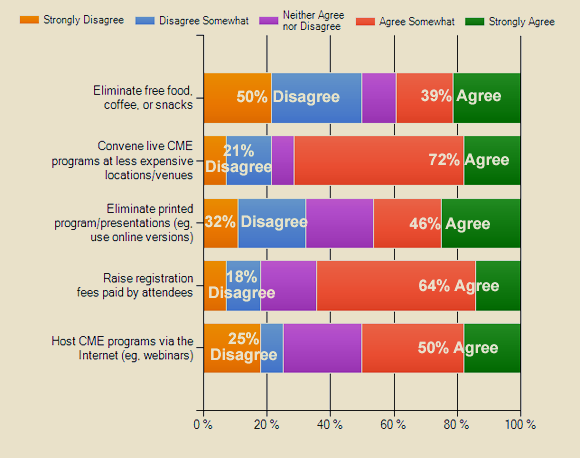Pharma Paid Celebrity Best Practices Should Pharma Disclose Payments to Celebrity Spokespeople? Pharma marketers in the U.S. sometimes use celebrities as spokespeople for their branded drugs or for non-branded campaigns. Such celebrities include TV personalities, athletes, movie stars and others who have thousands or millions of fans, Twitter followers, etc.
Pharma marketers in the U.S. sometimes use celebrities as spokespeople for their branded drugs or for non-branded campaigns. Such celebrities include TV personalities, athletes, movie stars and others who have thousands or millions of fans, Twitter followers, etc.
The subject of compensation for for celebrity pharma spokespeople was brought up in a Pharma Marketing Talk interview of Ambre Morley, Associate Director, Product Communications, Novo Nordisk, regarding Paula Deen, the celebrity chef who was hired by Novo Nordisk as a diabetes spokesperson (read/listen to “Novo Nordisk Defends Choice of Paula Deen as Diabetes Spokesperson”).
Obviously, Deen is being paid to do the deed, but she doesn’t want to talk about money because it’s “garish” according to her. But for pharma marketing pundits, talking about how much money is spent in the different areas of pharmaceutical marketing is a valid topic. We’d like to get a better idea how much money the drug industry spends on celebrity spokespeople as opposed to running DTC ads or wining and dining key opinion leaders, for example.
When Morley was asked the money question, she demurred and said “We don’t discuss compensation. If Paula was a regular, everyday employee, I couldn’t tell you how much she is making. I can’t tell you how much I’m making nor would I ask you how much you’re making.”
A few years ago, the pharma industry could have used the same excuse for not revealing how much they paid physicians as speakers, consultants, key opinion leaders, etc. But today there’s the Physician Payment Sunshine Act, which requires that all pharmaceutical companies reveal details about the payments they make to physicians (see “Proposed Rules for Physician Payment Sunshine Act”).
Of course, the main reason why this law was passed was because of potential conflicts of interest — physicians who are paid by pharma companies may be more likely to prescribe the drugs of those companies. Often, those drugs are more expensive than other, equally-effective products (eg, generics). Congress has a fiduciary duty to make sure that the government doesn’t overpay for services such as Medicare re-imbursements for prescription drugs. Consequently, the impetus for passing this law.
Celebrities, however, do not have the power to directly prescribe drugs. But they are VERY influential. Morley admits as much: “When you talk about the pharmaceutical industry and it’s spend on celebrities, it’s interesting because you wouldn’t see celebrities working on campaigns if it wasn’t a good investment from a marketing point of view.”
Given the power of of celebrities to influence people, should pharmaceutical pharmaceutical companies disclose the details of payments made to celebrities like like they are required to do for physician payments?
That’s just one of the questions Pharma Marketing News asked in its “Use of Paid Celebrity Speokespeople” survey. The survey specifically asked respondents to indicate how strongly they agreed or disagreed with the following statements regarding the use celebrities as pharma-paid spokespeople.:
- Celebrities should NOT be paid to promote branded drugs.
- It’s OK to pay celebrities to participate in unbranded disease awareness campaigns.
- Celebrity spokespeople provide a good return on marketing investment (ie, increase sales) for certain Rx drugs.
- Each pharmaceutical company should be required by law to publicly disclose how much money it pays every celebrity for being a spokesperson.
The results are summarized in the following chart, which shows the percentage of respondents who strongly agree or somwehat agree with each statement (N=XX):

- Convene live CME programs at less expensive locations/venues
- Eliminate free food, coffee, or snacks
- Eliminate printed program/presentations (eg, use online versions)
- Host CME programs via the Internet (eg, webinars)
- Raise registration fees paid by attendees

- Yes
- No
- Maybe, it depends
- No opinion

PMN1018-04
Issue: Vol. 10, No. 18: December 2011



![6 Digital Tools at the Center of Healthcare Digitalization [INFOGRAPHIC]](http://ec2-54-175-84-28.compute-1.amazonaws.com/pharma-mkting.com/wp-content/uploads/2021/04/6DigitalTools_600px-218x150.jpg)




![6 Digital Tools at the Center of Healthcare Digitalization [INFOGRAPHIC]](http://ec2-54-175-84-28.compute-1.amazonaws.com/pharma-mkting.com/wp-content/uploads/2021/04/6DigitalTools_600px-100x70.jpg)




